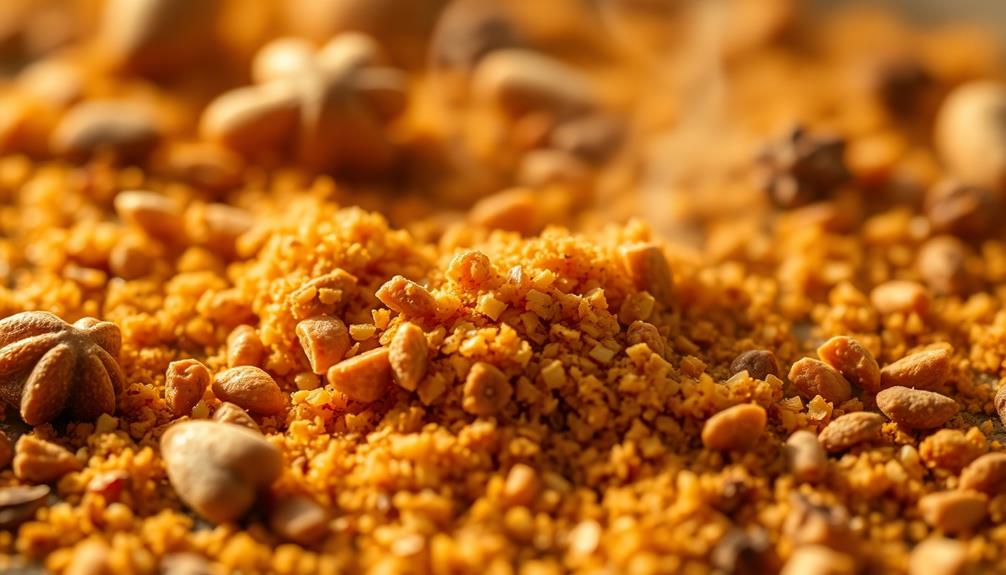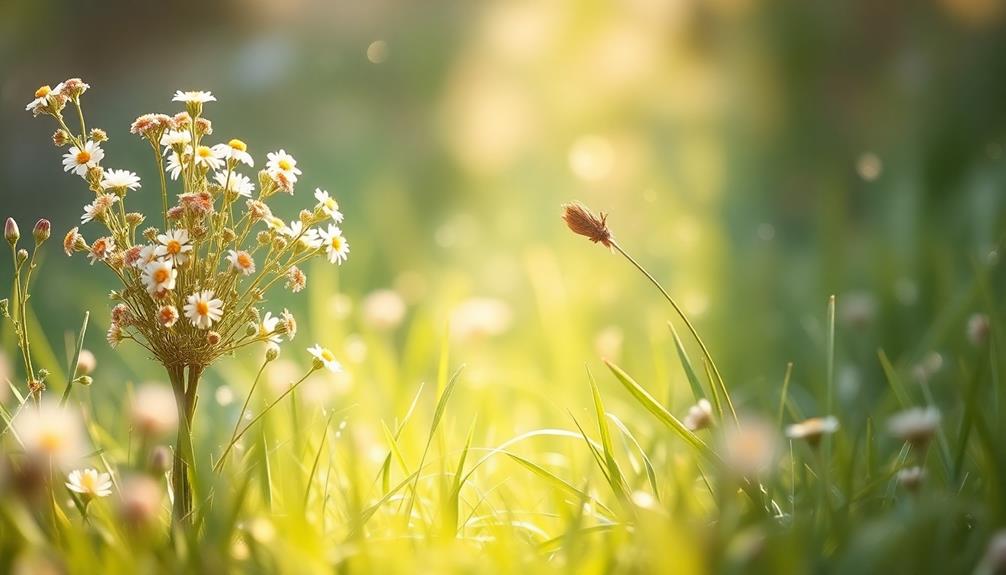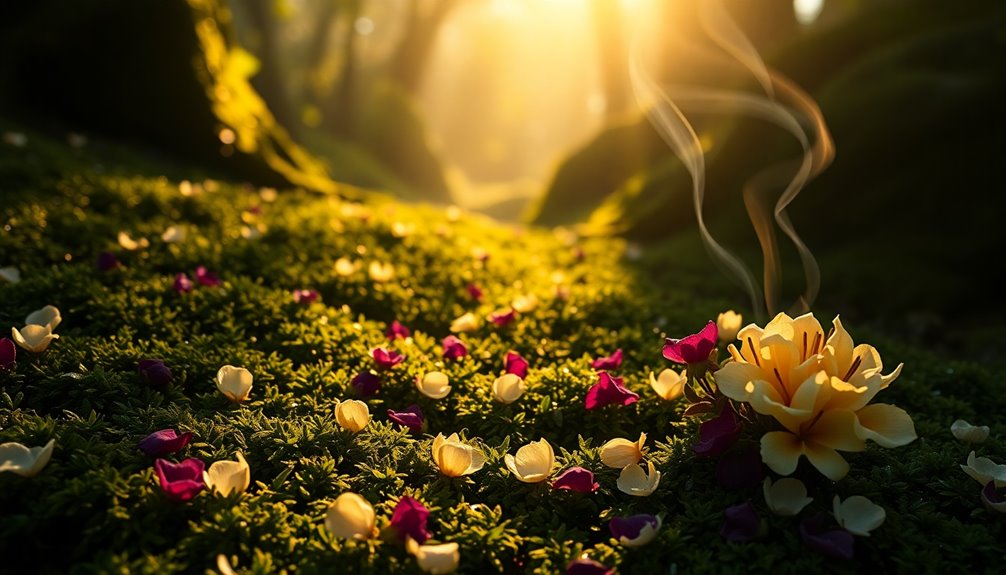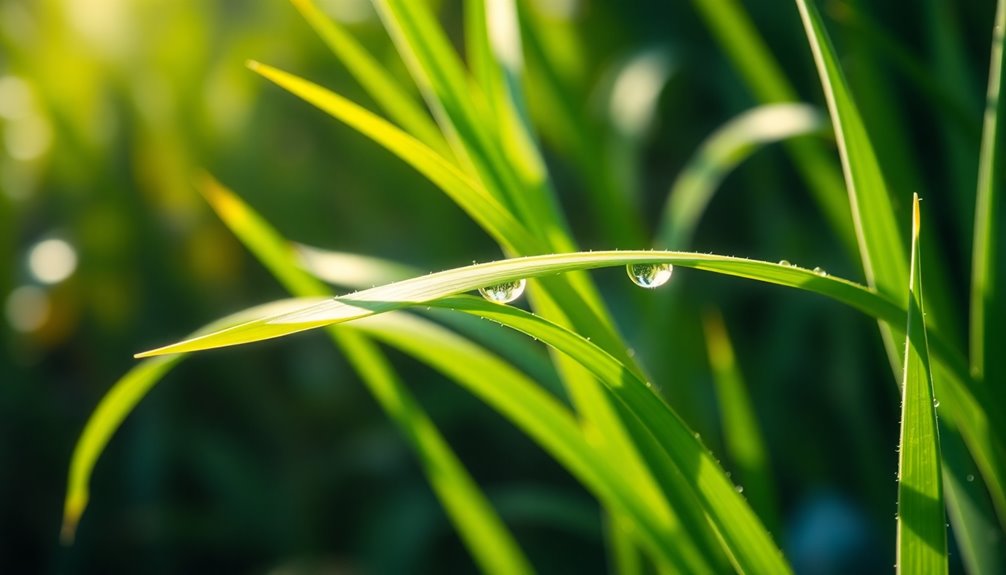Nutmeg smells warm and spicy, with rich, sweet notes that playfully blend with hints of clove and cinnamon. When you smell freshly ground nutmeg, you'll notice it's more potent than the pre-ground kind. Its unique scent comes from essential oils, giving it a comforting and complex aroma. This delightful fragrance often fills kitchens during the holidays and creates a cozy atmosphere. Nutmeg's warm scent can evoke feelings of nostalgia and joy, making it perfect for festive gatherings. You'll discover even more about this aromatic spice and its uses as you explore further.
Key Takeaways
- Nutmeg features a warm and spicy aroma, with rich sweetness and hints of clove and cinnamon.
- Freshly ground nutmeg emits a more potent and intoxicating scent than pre-ground varieties.
- The fragrance has woody undertones and subtle notes of turpentine, adding complexity.
- Nutmeg's aroma is attributed to terpenes and essential oils, including myristicin and elemicin.
- Commonly associated with winter gatherings, nutmeg evokes feelings of comfort and nostalgia.
Introduction
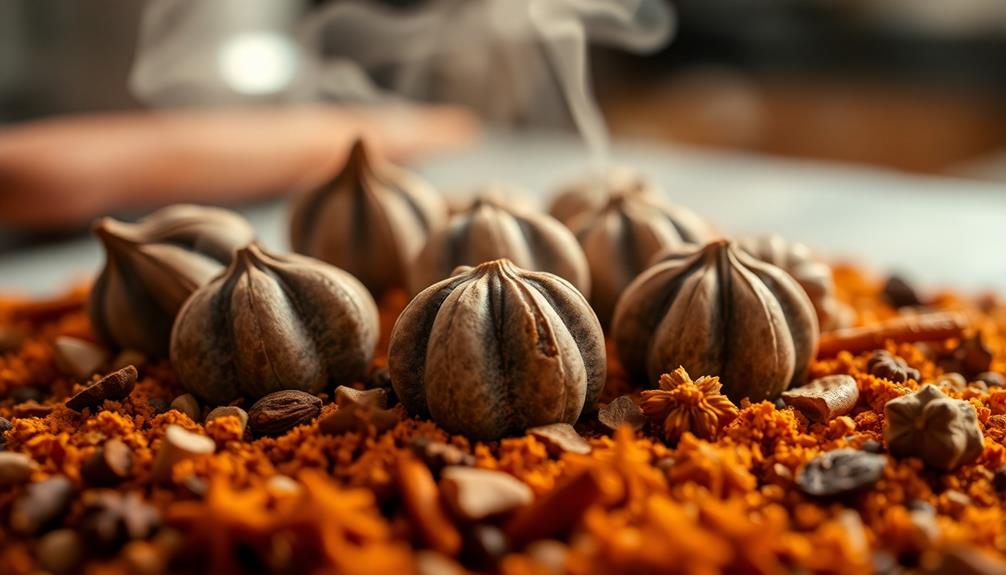
Nutmeg captivates the senses with its warm and spicy aroma, instantly transporting you to cozy winter gatherings. This delightful scent is rich and slightly sweet, with hints of clove and cinnamon, making it a favorite during the holiday season. You might find it in your favorite baked treats or savory dishes, bringing comfort and nostalgia to every bite.
If you're curious about nutmeg essential oil, you'll discover it's made through a careful process of sun exposure and steam distillation. This method creates a unique fragrance complexity that adds depth to its warm and spicy notes.
When you use freshly ground nutmeg, you'll notice a much stronger and more potent smell compared to pre-ground varieties, which can lose their aromatic power over time.
Nutmeg essential oil is often used in perfumery as a middle note, enhancing blends with its inviting aroma. Whether you're baking a pie or lighting a scented candle, nutmeg's scent can make any space feel warm and welcoming.
Description of the Smell
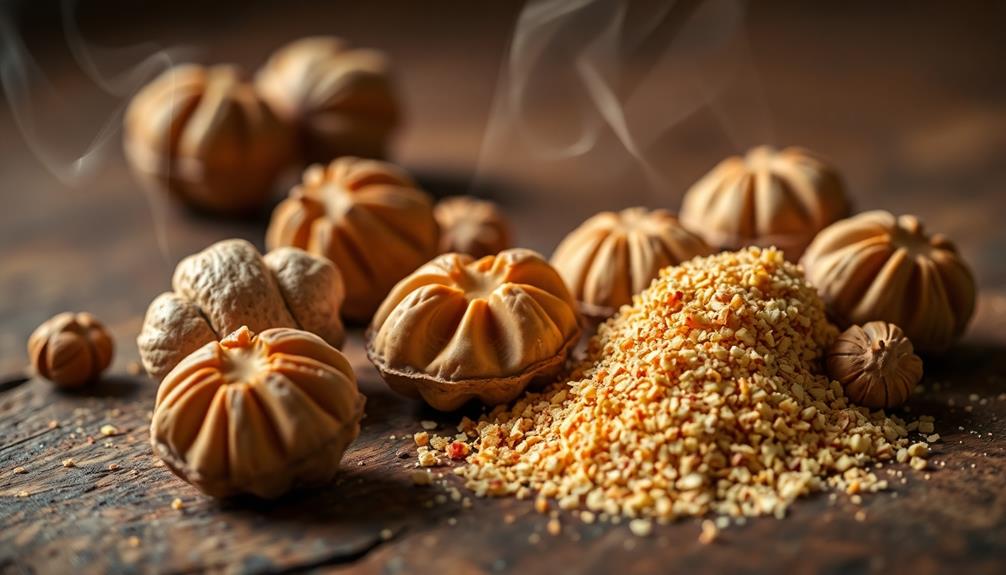
The smell of nutmeg is truly intoxicating, enveloping you in a warm embrace as you experience its spicy and sweet notes. This delightful aroma often reminds you of cozy holiday gatherings, filled with the comforting scents of home-cooked treats.
Nutmeg blends well with hints of clove and cinnamon, creating a rich, complex fragrance that dances in the air. You might notice that freshly ground nutmeg has a more potent scent compared to the pre-ground varieties.
When you open a jar of it, the fragrance can be almost overwhelming, with a touch of woodiness that adds depth. Sometimes, you may even detect a subtle hint of turpentine, thanks to the special oils inside.
These oils, like myristicin and elemicin, contribute to nutmeg's unique aroma profile. As you explore its scent, you can't help but feel a wave of nostalgia.
Nutmeg's warmth and spice make it a favorite in many culinary traditions. So, whether you're baking a pie or brewing a warm drink, remember that nutmeg's inviting smell is sure to bring a smile to your face and make every moment feel special.
Source and Composition
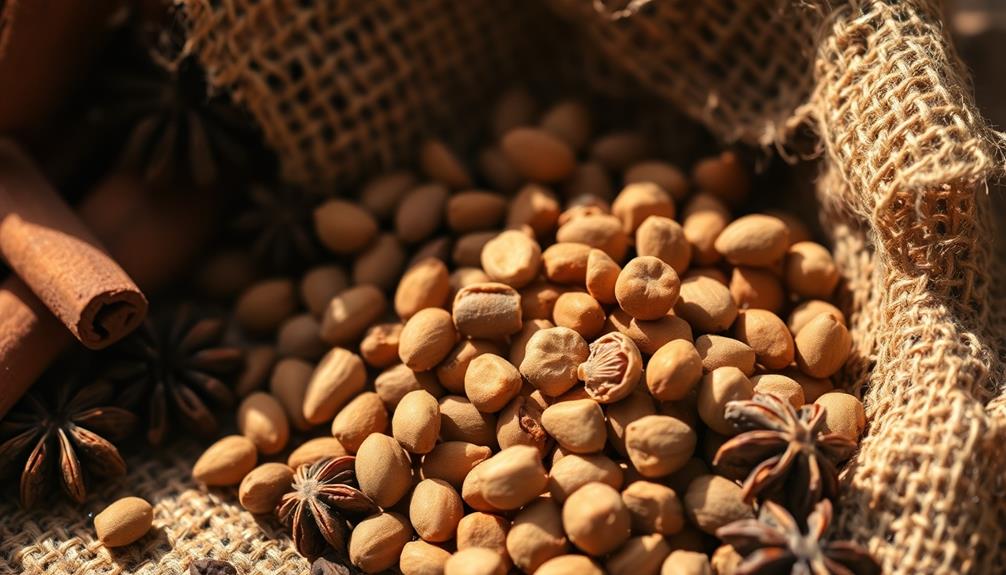
Derived from the Myristica fragrans tree, nutmeg's aroma comes from a rich blend of terpenes and essential oils. When you think of nutmeg, imagine a warm and spicy scent, thanks to its unique composition. The key players in this aromatic symphony are terpenes like pinene, sabinene, limonene, and eugenol. These terpenes make up about 5-13% of nutmeg's content, creating the lovely notes you enjoy.
The essential oil of nutmeg contains strong aroma components like myristicin and safrole, which add depth to the scent. If you ever try nutmeg absolute, you'll notice it has a richer and deeper aroma compared to the essential oil. This is perfect for creating complex fragrance blends because it focuses less on lighter top notes.
How nutmeg is extracted also matters. Hydrodistillation gives you lighter top notes, while regular distillation results in deeper scents.
Plus, the aroma can change depending on where the nutmeg is grown and who makes it. So, each product can have its own unique scent profile, making nutmeg an exciting ingredient to explore!
Typical Scenarios or Environments

There's something magical about the scent of nutmeg that transforms typical environments into cozy havens.
Imagine walking into a home during the winter months, where the nutmeg smell fills the air, wrapping you in warmth. It's often found in kitchens bustling with holiday baking, where pies and spiced beverages create feelings of comfort and nostalgia. You might notice it in a glass of eggnog or a cup of mulled wine, both of which invite you to relax and enjoy the moment.
In culinary settings, nutmeg's rich, sweet, and slightly woody notes enhance the flavors of savory dishes, making gatherings feel even more special.
Aromatherapy practices also embrace nutmeg, using essential oils in diffusers and candles to promote a soothing ambiance at home. Picture yourself enjoying a cozy evening, the nutmeg scent swirling around you, making everything feel more inviting.
Whether you're baking festive treats or setting the mood for a gathering, the nutmeg smell adds a layer of warmth. Its delicate spice blends effortlessly with other aromas, creating an inviting atmosphere that feels both cozy and nostalgic. Paired with the tangy, vibrant scent of fresh rhubarb, the room transforms into a symphony of contrasting yet harmonious fragrances. Together, they evoke memories of cherished holiday moments and homemade delights. The sweet, earthy fragrance of nutmeg balances beautifully with the tart, fruity notes of rhubarb, crafting a sensory experience that is as refreshing as it is comforting. For those who wonder what rhubarb smells like, it’s a clean, sharp scent, unmistakably fresh with a hint of citrus undertones that keep the profile zesty and invigorating. Together with nutmeg, it fills the air with a complexity that stirs the soul, reminding us of simpler times and the joy of culinary traditions.
Emotional or Cultural Associations

While many people associate nutmeg with the warmth of holiday gatherings, its emotional and cultural significance runs much deeper. When you smell ground nutmeg, it might remind you of cozy kitchens filled with the scent of baking cookies or spiced drinks during festive seasons. This warm, spicy aroma evokes feelings of comfort and nostalgia, making it a beloved part of many family traditions.
Historically, nutmeg was a luxury spice, symbolizing wealth and indulgence in trade. Its rich fragrance isn't just for cooking; it's also tied to various cultural celebrations around the world. Different cuisines incorporate ground nutmeg into their holiday recipes, uniting families and friends during special occasions.
In some cultures, nutmeg is used in rituals and traditional medicine, showcasing its importance beyond mere flavor. The comforting scent is also popular in aromatherapy, promoting relaxation and a sense of well-being.
Health or Safety Considerations
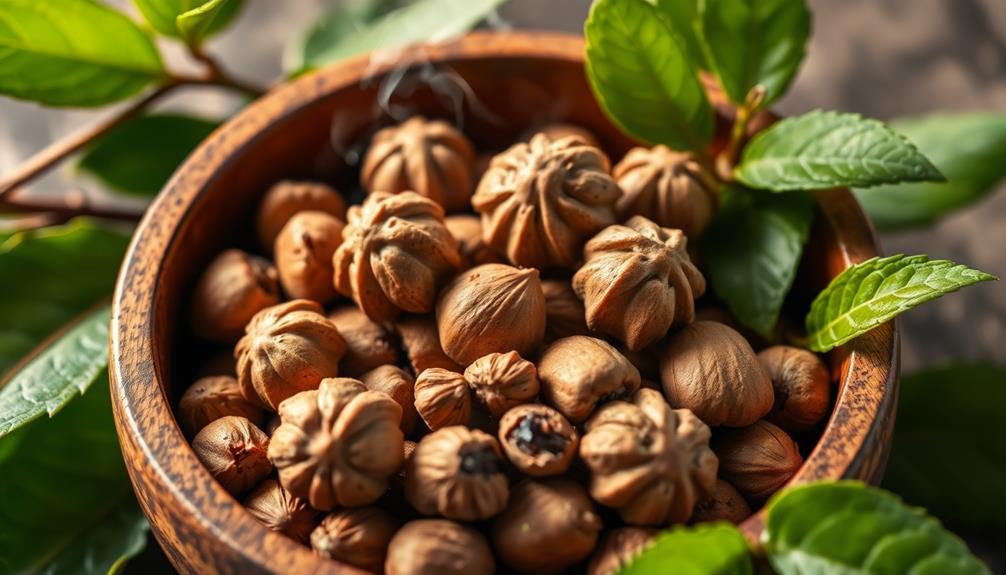
Nutmeg, a beloved spice in many kitchens, comes with health and safety considerations that can't be overlooked. While it adds a warm, inviting flavor to your dishes, you should know that nutmeg contains myristicin, which can be toxic in large amounts. Consuming too much nutmeg might lead to unpleasant effects like nausea or even hallucinations! To keep your cooking safe, stick to the recommended amount of 1 to 2 teaspoons.
Moderation is key. If you love using nutmeg, remember that excessive intake can result in serious health issues. Always treat this spice with respect. If you're thinking about using nutmeg for health purposes, it's best to consult a healthcare professional first, especially if you plan to use it in larger quantities.
Despite its culinary popularity, caution is essential. Nutmeg can be a delightful addition to your recipes, but overconsumption can lead to unwanted side effects.
Final Thoughts
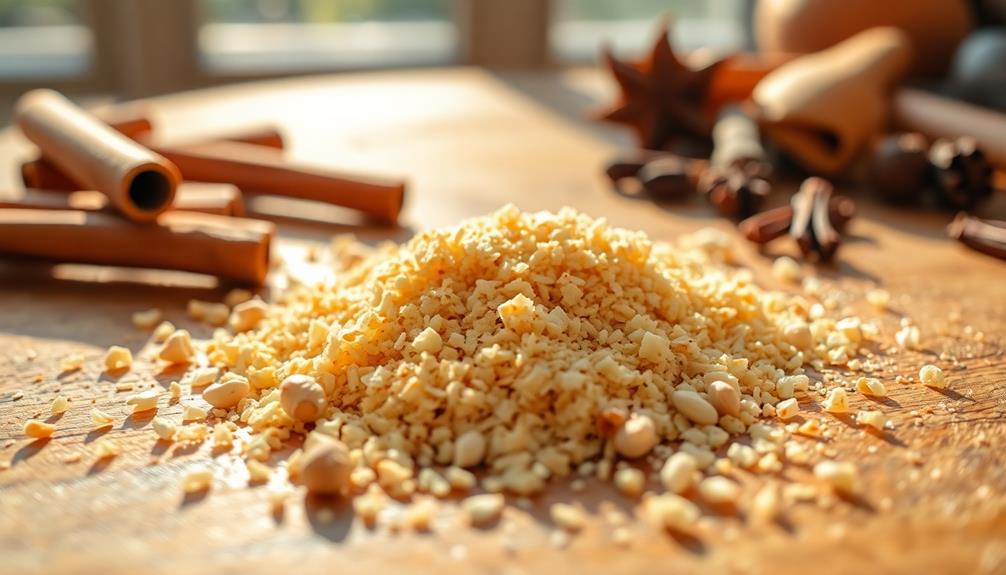
Understanding the complexities of nutmeg extends beyond its delightful flavor and aroma; it also involves appreciating its unique scent profile. When you take a whiff of nutmeg, you're greeted by a warming fragrance that wraps around you like a cozy blanket. This spicy aroma is a blend of woody notes, richness, and a hint of sweetness, often sparking feelings of comfort and nostalgia.
You might notice that nutmeg's scent reminds you of holiday baking, with hints of clove and cinnamon dancing in the air. If you use freshly ground nutmeg, you'll experience a more vibrant and potent scent compared to pre-ground options.
The essential oil of nutmeg carries this complex aroma, enhanced by subtle undertones of musk and tobacco. It's fascinating to learn that chemical components like myristicin and various terpenes create this unique fragrance.
No wonder nutmeg is often linked to holiday festivities and comforting meals! So, whether you're adding it to a recipe or simply enjoying its scent, let the warming fragrance of nutmeg bring joy and warmth to your life. Embrace its delightful essence and savor the cozy feelings it evokes.
Frequently Asked Questions
Does Nutmeg Smell Like Cinnamon?
Nutmeg doesn't exactly smell like cinnamon. While both spices share warm, spicy notes, nutmeg's scent is richer and woodier, with hints of clove, making it distinct. You'll notice the differences when you compare them.
What Else Smells Like Nutmeg?
You'll find that spices like cinnamon, clove, and allspice share similar warm, spicy aromas. Cardamom and ginger also evoke nutmeg's comforting scent, creating delightful flavor profiles when combined in your favorite dishes.
Does Nutmeg Smell Like Pepper?
Nutmeg doesn't smell like pepper at all. While nutmeg offers a warm, sweet aroma, pepper's scent is sharp and pungent. You'll notice distinct differences in their fragrance profiles when you encounter them.
Is Nutmeg Fragrant?
Absolutely, nutmeg's fragrant aroma captivates your senses. You'll notice warm, spicy notes combined with sweetness. When freshly ground, it truly shines, making your culinary creations feel nostalgic and comforting, especially during festive seasons.
